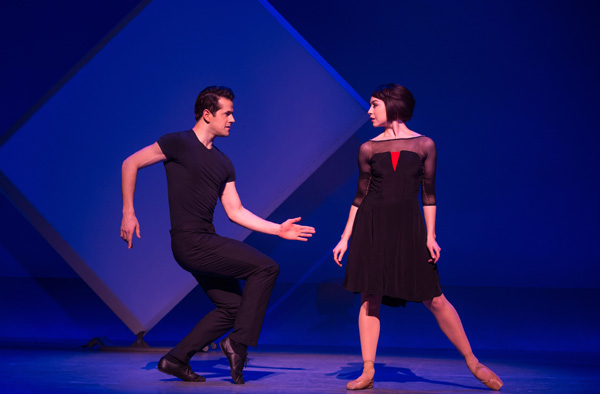An American in Paris

(© Matthew Murphy)
An American in Paris is a property one instinctively assumes is already a stage musical. The 1951 film starring Gene Kelly and Leslie Caron is a classic owing to Kelly's high-flying choreography and director Vincente Minnelli's vibrant cinematic vision. The movie took its name from George Gershwin's symphonic tribute to the French capital. It featured an array of songs Gershwin (and brother Ira) wrote for Broadway. This new adaptation returns their classic songs to the stage, along with a few that weren't in the film. While the production wowed Paris' Théâtre du Châtelet over the winter, it feels distinctly less exciting at Broadway's Palace Theatre. Yes, the show is full of transcendent moments of music and dance; but just as An American in Paris seems about to perform a grand jeté into something new and wonderful, it crashes awkwardly into the stultifying limits of the book-musical form.
The show is at its best when it breaks out of that form and director Christopher Wheeldon allows his brilliant choreography to tell the story. An opening number set to Gershwin's "Concerto in F" depicts the liberation of Paris from the Nazis, giving us an immediate sense of tone and context. An angry mob rips down the swastika that transforms into a tricolore billowing over the stage. Huddled Parisians wait in line for a baguette, jockeying for position. A suspected collaborator is hauled away screaming. This choreographed chaos gives us an immediate sense of hope, despair, and survival in the City of Light immediately post-occupation.
Emerging from the disarray is Jerry Mulligan (Robert Fairchild), an American GI who decides to make his life as an artist in Paris. He attracts the attention of philanthropist Milo Davenport (Jill Paice), who seems to want more than just his paintings. Jerry's two best friends are American composer Adam Hochberg (Brandon Uranowitz) and Henri Baurel (Max von Essen), the son of a wealthy French textile manufacturer. Henri wants to be a singer (and isn't interested in women), but his stern mother (Veanne Cox) expects him to carry on the family line by marrying Lise (Leanne Cope), an attractive young dancer they sheltered during the war. Naturally, Jerry also falls for Lise, courting her all over Paris.
Unfortunately, Jerry and Lise fade into the background compared to the supporting players. Uranowitz brings layers of lightness and charm to the moody composer. Paice is sultry and sophisticated as Milo. (Why doesn't Jerry like her, again?) Cox presents an ice-cold veneer that melts away at key moments of vulnerability. Their struggles seem infinitely more interesting than those of opaque Lise or arrogant Jerry.
It doesn't help that the story suffers from the chronic affliction of all jukebox musicals: It grinds to a halt so the cast can deliver a sparkling rendition of a Gershwin tune that only vaguely relates to the plot. As usual, this sometimes works well (as when von Essen delivers a high-kicking interpretation of "I'll Build a Stairway to Paradise" on the cabaret stage), but mostly feels shoehorned (like when Jerry gets a case of "Fidgety Feet" during a fancy benefit at the Baurels').
Of course, the movie suffered from the same dramaturgical problem, but compensated by presenting its nonsensical story through beautiful pictures. Bob Crowley's sets and costumes evoke the vibrant colors of the film without resorting to direct imitation. The ensemble costumes in the finale look like wearable Mondrian paintings, delightfully different from the storybook dream-world imagined by Minnelli. 59 Productions delivers flawless projections, sketching the city before us and bathing its masonry in beams of light. None of it quite makes up for a story that is more often confusing than it is enchanting.
Craig Lucas' updated book is teeming with dubious contrivance, some of it time-honored, some relatively new. The angst around Henri's clandestine stage career never reaches a boil before it is cooled by an encouraging pat on the back from dad. (It gets better…when your parents own a factory.) The charmless Jerry pursues Lise with the fervor of a Law & Order stalker, gleefully ignoring her repeated noes. Like a particularly aggressive Ellis Island immigration officer, he rechristens her with an Anglo name (although this is most certainly just an excuse to cram in the song "Liza"). We never quite figure out what changes her mind about Jerry, but we're told that theirs is "true love."
There is a temptation to blame the book in situations like this, but the problem is actually much more endemic. No book writer would have been able to save An American in Paris because its symphonic sound, hazy character sketches, and long stretches of fantasy all lend themselves better to dance — that's why the show seems to come alive in the balletic passages. One wonders what it could have been as a Matthew Bourne-style show: heavy on the story, but without all the talking.
We'd have a much easier time accepting Jerry and Lise in that milieu. His aggressive physical pursuit and her coyness translate much better into dance than dialogue. We see that in the breathtaking final ballet, in which Fairchild leaps across the stage to Cope and she sensuously wraps her legs around his. Now that is a love we can believe in. Too bad it takes us two and a half hours filled with mostly useless chitchat to get there.










